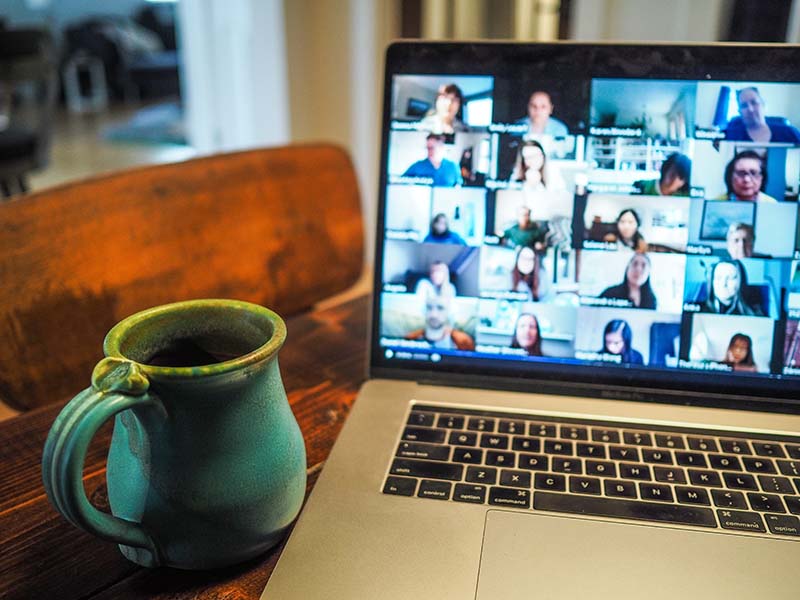
Update March 2, 2023 - Almost 2 1/2 years after this post I'm happy to say that we continue to find a balance that works for everyone in the company. Eventually, as COVID started to let up we determined that we were going to get back to the office. By that time though, a lot of us had figured out that we liked certain parts of working remotely. So when we decided to come back to the office we implemented a hybrid model and that's what we still have in place today. Mondays and Thursdays are remote days where employees can come into the office, or choose to work remotely. It's created a nice balance for us that captures the benefits of each scenario. This coming summer we're going to try a new experiment where employees can work anywhere they want for June & July - it's going to be fun. Being a "Great Place to Work" isn't an easy task and sometimes you have to embrace change, but I'm thankful Text-Em-All has.
Original Post - Four years ago, when I was hired, the company had never had a person who worked remotely. The plan was to relocate from California to Texas in June, but it was mid-August, and my wife (a teacher), and our kids had just begun the new school year. This started an experiment for our company to see if remote work could be something we eventually embraced. Ten months later, we considered the experiment a failure. Remote work simply wasn't going to "work" for us. Three more years and COVID-19 has forced our entire company to embrace working remotely. Read on to see how we overcame our failed remote work experiment and how our views have changed.
Many companies, particularly in technology or business services, embrace the idea of remote employees. Benefits can include access to a broader pool of applicants, improved employee retention, and productivity increases. Challenges include feelings of isolation, problems with communication, and a lack of motivation, leading to big problems for an organization. These challenges represented a perceived threat to the tight-knit and high-performing culture we spent years developing.
Until COVID-19, we also didn't have a real need that would require employees to work remotely. The Dallas market is full of talented high tech students and employees. We've developed a very successful internship program that has resulted in a steady stream of new employees. The geographic backgrounds of our employees are diverse, but everyone lives locally. Plus, our benefits include unlimited time off, and employees can work from home occasionally.
Our biggest fear, and the reason we didn't believe remote work was a good idea, was that we're going to lose some of the "secret sauce" that makes Text-Em-All such a great place to work. In the end, our fear, combined with the perception of limited benefits, gave us a narrow mindset.
Not committing to the remote experience.
In hindsight, we didn't make much of an effort to overcome the challenges we faced while I was working remotely. Once a month, I would fly to Texas and spend a week working in the office. Time in the office was always far more productive than when I was in California. One factor was that my co-workers tried to be considerate by not interrupting me throughout the day when I was remote. While we utilize chat tools like Slack and a Virtual PBX, we hadn't yet embraced video chat. Face-to-face meetings are essential to productive teams, whether in person or using video. We used video during our weekly all-hands scoreboard meeting, but that was often wrought with technology issues.
More insight on video chat is that it can be challenging when you have one person connecting to a room of 20 people vs. 21 people connecting individually online. In some ways, this is a great illustration of the problem we faced. I was one person connecting to a bigger team vs. a team of individuals connecting online.
In the end, I felt disconnected from my co-workers when I was remote. While I had plenty of work to keep me busy, I felt like I was missing out on conversations, brainstorming, and my chance at making a more significant impact.
Underestimating the importance of a physical workspace.
On the surface, the idea of working from home sounds great to those who have never done it. Except for deliveries, door-to-door salespersons, telemarketers, your kids forgetting things at home, your spouse needing you to run an errand, and just about anything else you can think of --- you might be able to focus more at home, maybe.
Don't get me started on my actual workspace. Of course, the company sent me a laptop, monitors, a phone, and everything else I needed... but my 10 x 10 home office was no substitute for the sit-stand desks, comfy chairs, snacks, drinks, and laughter that come with being in the office with people, especially when those people have a shared purpose and values.
Whether it's getting around a whiteboard and solving problems as a team, hearing a funny story from someone's weekend while getting your coffee, or merely building stronger bonds with people - being in a physical office is really motivational for me.
Embracing change, even when it slaps you in the face.
During the 2nd week of March, I was in Florida on Spring Break with my family. Since returning from that trip, I haven't worked in our office. As the pandemic unfolded, employee safety was easy to prioritize. Everyone was told to work from home, thinking like many that we'd be back in a week or two.
We were all trying to transition to remote work, but at the same time, one of our big use cases has always been emergency notifications. While everyone was trying to figure out home offices, we're also seeing crazy increases in new visitors, support requests, and our platform usage. One positive about getting slapped in the face is it also wakes you up!
Culture, purpose, and values really do matter.
We could have never overcome our failed remote work experiment if we didn't have such a strong company culture. Working as a tight-knit team with a shared purpose and values, surrounded by passionate people who hold you accountable and refuse to let each other down, going the extra mile to ensure we're not failing our customers - these are all things that define successful organizations, especially in a crisis.
Adversity is an opportunity in disguise.
As we started to understand that this crisis wasn't going to be short-lived, we went all-in on video chat. Today we use Zoom and Google Meet and have both of them integrated into Slack. We've done virtual happy hours, scheduled open hangouts for employees to drop in, and chat with each other. More importantly, our CEO spends a large portion of his time talking with employees on video every week. These face-to-face interactions are essential to keeping us connected. We've adopted the mindset that if you can chat with someone online, you should consider doing it over video.
As a company, we've pulled together during a time of uncertainty. Interactions had to become more purposeful. More attention was given to employee wellness. Check-ins became more frequent. You need something for your home office, ask. Need your sit-stand desk, get it. Oh, here's a care package with snacks and some gifts to make you feel appreciated. Need to change your 9-to-5 schedule, do it.
It hasn't been easy for everyone. You can imaging trying to work at home with kids who are trying to do virtual school, or a spouse who is also working at home, sharing bandwidth, not going out, stressing about the news, missing your family & friends, this isn't easy, and the situation may not change anytime soon.
We didn't overcome our earlier problems with some magical technology; we overcame it because we changed our mindset. We overcame because we already had a strong culture that unifies our organization. Employees aren't evaluated on how many hours they worked, but rather the quality of the work they turn out. More importantly, we operate with a high degree of trust. We overcame because it wasn't one person working remotely, it's all of us getting through this together - one day at a time.
In closing, being forced to work remotely has also made us question our view in general. Many of us who didn't think it was a good idea have learned to love working remotely. In fact, we're now putting together guidelines that will allow employees more remote work opportunities when we do get back into the office.












